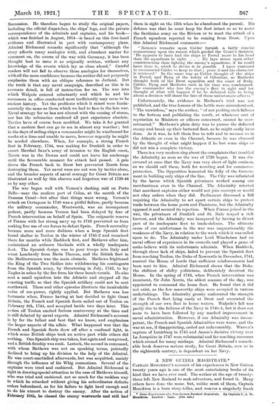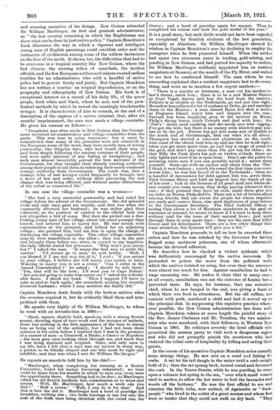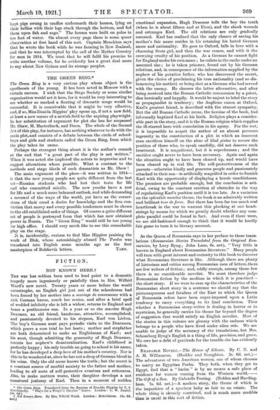A NEW GUINEA MAGISTRATE.*
CAPTAIN MorreKrox's account of his experiences in New Guinea twenty years ago is one of the most entertaining books of its kind that we have ever read. The author at the age of twenty- three left New Zealand to seek adventure, and found it. Many others have done the same, but, unlike most of them, Captain Monckton is a born story-teller, and weaves a singularly frank • Some Swaim= of a New Guinea Resident Magistrate. By Ceetain C. A. W. Monckton. London : Lane. 121s. net.1 and amusing narrative of his doings. New Guinea attracted Sir William MacGregor, its first and greatest administrator, as " the last country remaining in which the Englishman can show what can be done by just native policy." Captain Monckton's book illustrates the way in which a vigorous and intelligent young man of English parentage could establish order and the rudiments of civilization among some of the wildest barbarians on the face of the earth. It shows, too, the difficulties that had to be overcome in a tropical country like New Guinea, where the bad climate, the warring tribes of cannibals, the tactless officials, and the few European settlers and miners created endless troubles for an administrator who with a handful of native police had to govern firmly and justly. But Captain Monckton has not written a treatise on tropical dependencies, or on the geography and ethnography of New Guinea. His book is of exceptional interest as a record of his daily life, of the queer people, both white and black, whom he met, and of the para- doxical methods by which he tamed the seemingly irreclaimable savages. It is characteristic of him to remark, at the end of a description of the capture of a native criminal, that, after six months' imprisonment, the man was made a village constable. He gives his reasons as follows :- "Complaint was often made in New Guinea that the Govern. ment recruited its constabulary and village constables from the gaols. This was true in many instances ; but it must be remembered that many of the prisoners were not criminals in the European sense of the word, they were merely men of strong personality, like Oiogoba Sara, who had found their way to gaol from simply following the ancient customs of their people, and were quite ignorant of any feeling of wrongdoing ; and such men almost invariably proved the best servants of the Government, for they brought their already existing authority among their people to aid them in enforcing their newly conferred strange authority from Government. The result was, that a strange tribe of raw savages could frequently be brought into a state of law and order, without their perceiving the real change that was being effected, and without undue disturbance of the tribal or communal life."
In one case the village constable was a woman:- " She had a very masterful personality and had ruled her village before the advent of the Government. She did splendid work-and only once gave me trouble, and that was when she summarily divorced her husband ; he was rather glad than otherwise, as the position of consort to the official lady was not altogether a bed of roses. But then she picked out a fine- looking young man of her village, about ten years younger than herself, and ordered him to marry her. He was struck with consternation at the prospect, and bolted for an adjoining village ; she pursued him, and ran him in upon the charge of disobeying the village constable. Two other village constables near-by were scandalized at the affair ; they ran in the pair and brought them before me, when, in answer to my inquiries, the lady official stated her grievance. ' Why won't you marry her ? ' I asked the man. ` It seems the best way to settle the matter.' I'd sooner go to gaol,' he said briefly. ` Well, I am blessed if I see any way out of it,' I said ; if you return to your village, I believe she will marry you sooner or later. Wanting to marry you is not a crime.' ` Can I enlist in the Armed Constabulary ? ' he asked ; I should bo safe there.' ` Yes, that will be the best ; I'll send you to Cape Nelson.' ' Are you not going to make him marry me ? ' asked the redoubt- able dame. I shook my head. ' Then I suppose I'll have to take so-and-so back again,' she remarked, naming her recently divorced husband ; which I may mention she finally did."
Captain Monckton dealt firmly with the lawless natives when the occasion required it, but he evidently liked them and sym- pathized with them.
He speaks very highly of Sir William MacGregor, to whom he went with an introduction in 1895:—
• " Short, square, slightly bald, speaking with a strong Scotch accent, showing signs of over-work and the ravages of malaria, there was nothing in the first appearance of the man to stamp him as being out of the ordinary, but I had not been three minutes in his cabin before I realized that I was in the presence of a master of men—a Cromwell, a Drake, a Caesar or Napoleon —his keen grey eyes looking clean through me, and knew that I was being summed and weighed. Once, and only once in my life, have I felt that a man was my master in every way, a person to be blindly obeyed and one who must be right and infallible, and that was when I met Sir William MacGregor."
He repeats an anecdote told him by his chief:— "MacGregor, when completing his training at a Scotch University, found his money becoming exhausted ; no time could he spare from his studies in which to earn any, even were the opportunity there. Something had to be dons, so MacGregor called his old Scotch landlady into consultation as to ways and means. ` Well, Mr. MacGregor, how much a week can you find ? " Half a crown.' Well, I can do it for that.' And this is how she did it. MacGregor had a bowl of porridge for breakfast, nothing else ' • two fresh herrings or one red one, the cost of the fresh ones being identical with the cured one, for
dinner ; and a bowl of porridge again for supper. Thus he completed his course and took the gold medal of his year."
It is a good story, but such thrift would not have been regarded as exceptional by Scottish students of . the last generation, especially at Aberdeen. Sir William MacGregor showed his
wisdom in Captain Monckton's case by declining to employ the youngster when he first presented himself. When the author had spent two strenuous years in trading, gold-mining, and pearling in New Guinea, and had proved his capacity to endure, Sir William MacGregor suddenly appointed him as resident
magistrate at Samarai, at the mouth of the Fly River, and waited to see how ho conducted himself. The man whom he was succeeding explained that a resident magistrate had to do every- thing, and went on to mention a few urgent matters:— "There is a murder at Awaiama, a man out his mother-in- 'law's throat, catch him ; there is to be a new Mission Station at Cape Vogel, survey and buy the land from the natives ; Fellows is in trouble at the Trobriands, go and put him right ; Bromilow has collected a lot of orphans at Dobu, go and mandate them to the Mission ; a man named Ryan has shot a native at Ferguson Island, arrest him and inquire into the case ; Carruth has been supplying grog to the natives on Burns, Philp's diving boats, catch Carruth and deal with him ; the 4Siar's ' decks need caulking and she needs new wire rigging ; I've got the wire, but there is no money with which to pay any- one to do the job. Patten has got into some sort of trouble at the south end of Goodenough, find out what it's all about ; Thompson has started a coco-nut plantation on the north- west coast of the island, look him up and see that he is all right ; when you get some spare time, go and buy a cargo of yams for the gaol, and don't pay more than 10s. per ton for them ; see that Billy the Cook shuts his pub at twelve o'clock, there are only fights and rows if he is open later. Don't use the police for arresting white men if you can possibly avoid it ; arrest them yourself. Some one stole an anchor and chain from the Siai,' I think it was Graham ; search his vessel the first time you come across him ; he was last heard of in the Trobriands ; there are a handful of summonses for debt against him too, serve them. Find German Harry and hold an inquest into the death of one of his crew ; look at the licences of all pearl shell and beche-de- mer vessels you come across, they dodge paying whenever they can ; if they pretend they have no cash, make them give you an order on Bums, Philp and Co. There are a lot of letters about missing friends, find out about the people for whom inquiries are made and answer them, also send duplicates of your letters to the Government Secretary. The Chief Judicial Officer is raising Cain about a lot of Mambare munderers in the gaol on warrants of remand, he wants to know if I iv tend to keep them without trial for the term of their natural lives ; just work through them in your spare time : they are the men that killed Green and his detachment. There are a few other things that want attention, but Symons will give you a list."
Captain Monckton proceeds to tell us how he executed these orders and how he was rebuked by the Governor for having flogged some mutinous prisoners, one of whom afterwards became his devoted adherent.
He describes how he checked a violent epidemic which was deliberately encouraged by the native sorcerers. He pretended to poison the water from the polluted wells which the natives insisted on using, but even then the sorcerers were almost too much for him. Against cannibalism he had to wage unceasing war. He makes it clear that in many cases, at all events, cannibalism was not the outcome of famine but a perverted taste. He says, for instance, that one notorious chief, whom he saw hanged in the end, was giving a feast at which there was food in abundance. But the old ruffian, not content with pork, murdered a child and had it served up as the principal dish. In suppressing this repulsive practice where- ever possible, the New Guinea administration has done well. Captain Monckton relates at some length the painful story of the Rev. James Chalmers and Mr. Tomkins, the two mission- aries who were murdered, with their followers, in Western New Guinea in 1901. He criticizes severely the local officials who permitted the mission party to visit such a dangerous region and who did not promptly punish the murderers who had violated the tribal code of hospitality by killing and eating their guests.
In the course of his narrative Captain Monckton notes casually some strange things. He saw rats on a coral reef fishing for crabs. A rat let his tail dangle in the water until a crab caught hold of it ; then the rat sprang back, turned round and devoured the crab. In the Torres Straits, while he was pearling, he came upon a volcanic hot spring in the sea, " over which small vessels used to anchor, to allow the hot water to boil the barnacles and weeds off the bottoms." He was the first official to see and examine the little tribe, now extinct, of Agaiambu or "'duck- people" who lived in-the midst of a great morass and whese feet were so tender that they could not walk on dry land. " They
kept pigs swung in cradles underneath their houses, lying on their bellies with their legs stuck through the bottom, and fed them upon fish and sago." The houses were built on poles in ten feet of water. On almost every page there is some queer observation at first hand of this sort. Captain Monckton says that he wrote the book while he was farming in New Zealand, and that he was interrupted by the call of the Mother Country for men in 1914. We trust that he will fulfil his promise to write another volume, for he evidently has a great deal more to say about New Guinea and its strange peoples.




































 Previous page
Previous page